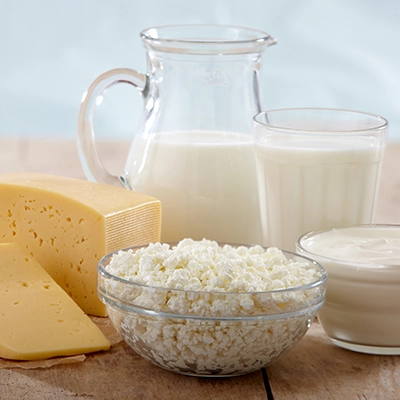Does Milk Help You Sleep?
Dairy comes in many different forms, each with a package of important vitamins and minerals. And the health benefits associated with dairy’s nutrition aren’t just limited to the daytime — you can get those same benefits at night, too. As part of a healthy diet, enjoying milk, cheese or yogurt before bed might help you sleep better.
Sleep gives our bodies a chance to recover, reset and prepare for the next day. Therefore, sleep affects brain performance, mood and health. Beyond sleep hygiene routines, lifestyle factors like diet can play an important role in sleep quality. Research suggests that incorporating dairy foods, with their unique nutrients and compounds, to your healthy diet may help support a good night’s rest.
What Happens When You Have a Glass Of Milk Before Bed?
Milk provides 13 essential nutrients that each offer important benefits. From building strong bones and muscles to supporting immune health and sustained energy, milk’s nutrition plays many physiological roles. But, does milk help you sleep?
Dairy foods like milk contain tryptophan, magnesium and zinc which are essential for serotonin and melatonin production — both of which can contribute to sleep promotion. Additionally, research suggests the antioxidant and anti-inflammatory components in milk and other dairy foods may contribute to improved sleep quality. Lastly, sipping a warm beverage can have soothing effects in a bedtime routine.
So when you drink warm milk before bed (or cold milk, if that’s your thing), you’re not only nourishing your body with nutrition, you might be helping your body sleep more easily too.
What Happens When You Eat Cheese Before Bed?
Another popular and delicious form of dairy, cheese delivers eight essential nutrients. And just like the nutrients in milk, each one has unique roles. Similarly, cheese can be a beneficial bedtime snack.
In addition to its sleep-promoting tryptophan, magnesium and zinc, cheese provides high-quality protein, including casein, which is important for muscle repair. When we sleep, our body undergoes a considerable reset process. So eating casein foods like cheese before bed can leverage this nightly recovery and maintenance. Protein foods are also satisfying and can thereby have a calming effect, making that charcuterie board even more enticing at night.
So, if you enjoy cheese before bed, you might find yourself resting easier as your body recovers and repairs, allowing you to wake up ready to seize the day.
What Happens When You Eat Yogurt Before Bed?
Not to be outdone, yogurt is another popular dairy food packing a nutritional punch. Yogurt provides nine essential nutrients, including protein and zinc. That, alongside the tryptophan and magnesium it contains, makes yogurt a smart addition to a sleep-supporting diet. But there’s another reason this gut-healthy dairy food may lead to better sleep.
Research suggests that fermented dairy foods contain gamma-aminobutyric acid (GABA), an inhibitory neurotransmitter that may help sleep quality. And fermented dairy foods like yogurt have unique bioactive compounds that can have anti-inflammatory properties, contributing to a restorative night’s sleep. Lastly, as a probiotic food, yogurt fuels a healthy microbiome, which may support mental health and wellbeing via the gut-brain axis.
So a nighttime ritual that includes yogurt may help ease your mind and body, together supporting a better night’s rest.
What Happens When You Have a Dairy Dilemma?
While dairy foods may help you rest easier at night, not everyone can enjoy a late-night dairy snack in the same way. Conditions such as lactose intolerance and dairy allergy will directly affect the type and amount of dairy foods a person can tolerate. If someone has a dairy allergy, it’s best to avoid dairy products entirely. Alternatively, people who are lactose intolerant might not have to give up dairy completely—they could benefit from lactose-friendly tips, such as giving Greek yogurt or lactose-free milk a try.
Dairy’s Bedtime Benefits: A Short Summary
Dairy food nutrition can benefit you throughout the day and night. Here’s a short summary of dairy’s bedtime benefits:
- Dairy foods contain tryptophan, magnesium and zinc, which are essential for serotonin and melatonin production — both of which can contribute to sleep promotion.
- The antioxidant and anti-inflammatory components in milk and other dairy foods may contribute to improvement in sleep quality.
- The high-quality protein in dairy foods like cheese can have a beneficial bedtime calming effect and support restorative sleep.
- The GABA in yogurt and other fermented dairy foods may help improve sleep quality.
















